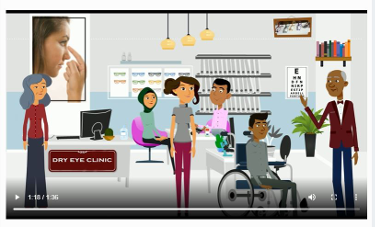Clinical trials - recruiting subjects
The ADP Consultancy conducts clinical trials for the purpose of increasing our knowledge in the field of eye care. We are happy to receive communication from other ECPs/HCPs on referrals for the trials and returning patients to you for continuing care with reports on each patient. We are also happy to pubish details on clinical trials being undertaken elsewhere.
Meibomian gland disease - Intense Pulsed Light & Low Level Light Therapies
09/02/2024: Researchers from Aston Optometry School are assessing how light-based therapies, known to be effective for dry eye disease treatment, work to improve the health of our oil glands in our eyelids. These include intense pulsed light therapy (IPL) and low-level light therapy (LLLT).
We are seeking adult volunteer participants aged 18 and over who are suffering from a specific form of dry eye disease where the oil glands in your eyelids are not working properly (called Meibomian gland disease).
You will not be able to participate if you are pregnant, wore contact lenses in the past 2 weeks or will be during the study, have only 1 eye, have systemic conditions that can cause dry eye disease such as diabetes or Sjögren’s syndrome, contraindicated for IPL treatment (e.g. have photosensitive epilepsy, used photosensitising medication in the past 3 months, have tattoos, implants, electrical or acoustic prosthetics, semi-permanent make-up, pigmented lesions or skin cancers in the treatment area, have pacemakers or have darker skin tone: Fitzpatrick skin type V or VI), had facial or ocular light therapies in the past 6 months, or had a history of ocular surgery or corneal infections.
You will attend a total of 6 visits (4 treatment visits provided for free 2 to 3 weeks apart, and then 2 follow-up visits 2 weeks and 3 months after the final treatment visit). If you are eligible and suitable for treatment, one of your eyes will be randomised to receiving both IPL and LLLT, and the other eye will receive LLLT alone so that we can compare how these treatments work.
Your blood flow in the eyelids and nerves on the surface of the eyes will also be analysed using sophisticated, non-invasive instruments during the first and follow-up visits. Each visit lasts about 1.5 hours. If you would like to hear more, or are interested in participating, please contact Dr Jeremy Chiang (
Contact Lens Discomfort Trial - at-home Treatment
20/07/2021: The ADP Consultancy conducts clinical trials for the purpose of increasing our knowledge in the field of eye care. We hope to have a trial under way soon looking at-home treatments for contact lens discomfort, if you think you would like to find out more about how you might help, or may be interested in future trials and live within traveling distance of Nantwich. We are looking for subjects who find their contact lenses are not as comfortable as they would like, especially at the end of the day. The trial does not involve changing lenses or solutions. The object of the clinical trial is to determine if a specific at-home treatment reduces contact lens discomfort. Subjects will be paid to be part of the trial and provided with all treatment products free-of-charge. If you would like to know more about this trial please email
Prevalance of Meibomian gland loss in a population
Not so much a clinical trial, but certainly reserach, as part of the normal eye exam (sight test) provided by S W & C Jackson Opticians of Nantwich, Meibomian gland screening with grading will be included at no extra charge. As well as offering more information to individual patients on their eye health it will generate fully anonymised data on the the prevelance and grading of Meibomian gland loss in both symptomatic and non-symptomatic patients. It is anticipated this will generate data on hundreds of eyes in a relatively short space of time that can help improve care of dry eye and potential dry eye patients. If you are a patient who would like to have this screening included in your next general eye exam at no extra charge email
DOORS Press Release
A new health study is to be launched in a bid to help millions who suffer from ‘dry eye’.
One in four of us will suffer from the debilitating condition with symptoms ranging from sore eyes through to short-term blurred vision.
Now experts based in Birmingham and Nottingham are looking for people to take part in the study, wearing a special contact lens for under 2 weeks, which could lead to longer term relief.
Volunteers are being sought for the research which is being conducted by Aston University’s Eye Clinic in collaboration with Nottingham’s NuVision Biotherapies, a company formed with backing of the University of Nottingham.
The study follows the development of an eyesight-saving product, Omnigen, derived from human amniotic membrane donated from caesarean sections. Up until recently it could only be applied surgically but NuVision have created OmniLenz.
This bespoke contact lens allows the surgery-free application of Omnigen. Such a simple, 5-minute procedure enables eyecare professions to treat ocular surface diseases, as simply as applying a contact lens, early and more effectively without the need for surgery.
Professor James Wolffsohn, principle investigator of the study, said: “Dry eye can be a severe, chronic and debilitating disease. Amniotic membrane has shown great promise in its management, but retention on the eye is required. We want to see how we can help people with dry eye by applying this lens.
“Omnigen is already successfully used throughout the NHS and the study aims to demonstrate that the wound healing benefits of Omnigen are easily transferable to those suffering and living with dry eye disease.”
This trial is designed as a prospective, double-arm, investigational randomised study to examine the change in dry eye disease symptoms and pathology following the in-clinic OmniLenz transplantation of Omnigen for patients suffering from moderate to severe dry eye disease.
Founder and Chief Scientific Officer of NuVision, Dr. Andrew Hopkinson, said: “Amniotic membrane has clinically proven wound healing capability which historically has been reserved for severe surgical situations. Through the innovation of OmniLenz application of Omnigen in an out-patient setting, NuVision is already helping to treat patients with severe ocular surface injuries. However, this clinical trial now aims to demonstrate a benefit to those suffering from dry eye disease.”
NuVision received support from the INSTILS project – part-funded through the European Regional Development Fund (ERDF) and delivered by Medilink East Midlands. Thanks to INSTILS support, NuVision received an Innovation Support Grant, to the value of £12,920, which will allow them to undertake this study with Aston University, accelerating the clinical trial process and bringing NuVision’s novel approach to market faster than would have otherwise been possible.
Darren Clark, Chief Executive of Medilink East Midlands, said: “NuVision has a truly innovative and outstanding approach to treating dry eye disease. I am confident that the help we’ve given to them, both in terms of the Innovation Support Grant and the dedicated time and effort that one of our Innovation Advisers has invested in them, will make their treatment available quicker, improving outcomes for patients worldwide.”
If you are interested in taking part in the study, please contact
Contact Lens Discomfort Trial - In-Practice Treatment
We are looking for subjects who find their contact lenses are not as comfortable as they would like, especially at the end of the day. The trial does not involve changing lenses or solutions but rather treating the eye's vital meibomian glands that secrete protective oils into the tears. The object of the clinical trial is to determine if, and for how long, a one-off in-practice treatment reduces contact lens discomfort. If you would like to know more about this trial please and could attend the clinics in Nantwich, Southport or Leyland please email
Made-to-Order Multifocal Contact Lens Trial
Would a 'tailor made' made-to-order multifocal lens perfor better than the equivalant widely prescribed off-the-shelf alternative? A few statistically signifianct differences were found for visual acuity and subjective vision and the overall performance of 'tailor made' lens was much better than off-the-shelf alternative. These aspects could be leveraged in a marketing campaign among contact lens practices seeking to have better overall success with multifocal soft conact lenses. 08/01/2017 Update: This trial has now completed and closed with report issued to sponsor.
Multi-Focal Contact Lens Trial (two separate trials)
We are looking for subjects who are over 42 and require different prescriptions for distance and near, bifocal/varifocal glasses, two pairs of glasses, removes distance glasses to read, glasses over contact lenses to read or monovision contact lenses. The object of the clinical trial is to determine if vision with contact lenses changes over a time period. Subjects who complete the clinical trial and are successful with the sponsor's lenses will be offered 3 months lenses free-of-charge (approx value £150.00). The subjects would be prescribed one or two pairs of lenses to wear for a week, normally three to four practice visits will be required. 05/05/2017 Update: Both of these trials has now completed and closed with report issued to sponsor.
Contact Lens Discomfort Trial
We are looking for subjects who find their contact lenses are not as comfortable as they would like, especially at the end of the day. The trial does not involve changing lenses or solutions but rather using a means to retain more tears on the eye surface. the object of the clinical trial is to determine if retaining more tears on the eye surface reduces contact lens discomfort. Subjects who complete the clinical trial will be given £100.00 practice credit. 23/12/2016 Update: This trial has now completed and closed. Interim results have been published. If you are interested in the interim results and what it may mean to you as a Contact Lens wearer email
Contact Lens Uncorrected Cyl Trial
We are looking for subjects (both CL and non-CL wearers) between 18 and 40 who have cylinder corrections up to and including -1.00 at any axis with sphere powers obtainable in daily disposable lenses. The subjects will wear both a toric and a spherical lens on two different occasions with the aim of determining if their is a objective and/or subjective visual benefit to correcting small cyls with toric lenses. Subjects who complete the trial will be offered £50 payment and £50 practice credit. For further information email










